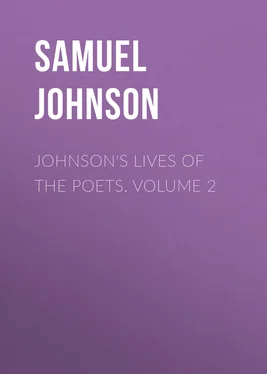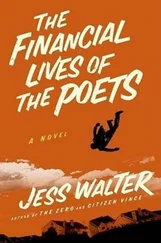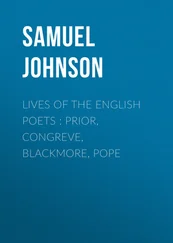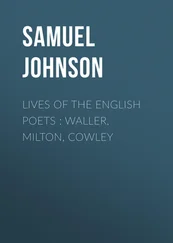Samuel Johnson - Johnson's Lives of the Poets. Volume 2
Здесь есть возможность читать онлайн «Samuel Johnson - Johnson's Lives of the Poets. Volume 2» — ознакомительный отрывок электронной книги совершенно бесплатно, а после прочтения отрывка купить полную версию. В некоторых случаях можно слушать аудио, скачать через торрент в формате fb2 и присутствует краткое содержание. Издательство: Иностранный паблик, Жанр: foreign_poetry, literature_18, Поэзия, foreign_antique, foreign_prose, на английском языке. Описание произведения, (предисловие) а так же отзывы посетителей доступны на портале библиотеки ЛибКат.
- Название:Johnson's Lives of the Poets. Volume 2
- Автор:
- Издательство:Иностранный паблик
- Жанр:
- Год:неизвестен
- ISBN:нет данных
- Рейтинг книги:5 / 5. Голосов: 1
-
Избранное:Добавить в избранное
- Отзывы:
-
Ваша оценка:
- 100
- 1
- 2
- 3
- 4
- 5
Johnson's Lives of the Poets. Volume 2: краткое содержание, описание и аннотация
Предлагаем к чтению аннотацию, описание, краткое содержание или предисловие (зависит от того, что написал сам автор книги «Johnson's Lives of the Poets. Volume 2»). Если вы не нашли необходимую информацию о книге — напишите в комментариях, мы постараемся отыскать её.
Johnson's Lives of the Poets. Volume 2 — читать онлайн ознакомительный отрывок
Ниже представлен текст книги, разбитый по страницам. Система сохранения места последней прочитанной страницы, позволяет с удобством читать онлайн бесплатно книгу «Johnson's Lives of the Poets. Volume 2», без необходимости каждый раз заново искать на чём Вы остановились. Поставьте закладку, и сможете в любой момент перейти на страницу, на которой закончили чтение.
Интервал:
Закладка:
PARNELL
The life of Dr. Parnell is a task which I should very willingly decline, since it has been lately written by Goldsmith, a man of such variety of powers, and such felicity of performance, that he always seemed to do best that which he was doing; a man who had the art of being minute without tediousness, and general without confusion; whose language was copious without exuberance, exact without constraint, and easy without weakness.
What such an author has told, who would tell again? I have made an abstract from his larger narrative; and have this gratification from my attempt, that it gives me an opportunity of paying due tribute to the memory of Goldsmith.
Thomas Parnell was the son of a Commonwealthsman of the same name, who, at the Restoration, left Congleton, in Cheshire, where the family had been established for several centuries, and, settling in Ireland, purchased an estate, which, with his lands in Cheshire, descended to the poet, who was born at Dublin in 1679; and, after the usual education at a grammar school, was, at the age of thirteen, admitted into the College where, in 1700, he became Master of Arts; and was the same year ordained a deacon, though under the canonical age, by a dispensation from the Bishop of Derry.
About three years afterwards he was made a priest and in 1705 Dr. Ashe, the Bishop of Clogher, conferred upon him the archdeaconry of Clogher. About the same time he married Mrs. Anne Minchin, an amiable lady, by whom he had two sons, who died young, and a daughter, who long survived him.
At the ejection of the Whigs, in the end of Queen Anne's reign, Parnell was persuaded to change his party, not without much censure from those whom he forsook, and was received by the new Ministry as a valuable reinforcement. When the Earl of Oxford was told that Dr. Parnell waited among the crowd in the outer room, he went, by the persuasion of Swift, with his Treasurer's staff in his hand, to inquire for him, and to bid him welcome; and, as may be inferred from Pope's dedication, admitted him as a favourite companion to his convivial hours, but, as it seems often to have happened in those times to the favourites of the great, without attention to his fortune, which, however, was in no great need of improvement.
Parnell, who did not want ambition or vanity, was desirous to make himself conspicuous, and to show how worthy he was of high preferment. As he thought himself qualified to become a popular preacher, he displayed his elocution with great success in the pulpits of London; but the Queen's death putting an end to his expectations, abated his diligence; and Pope represents him as falling from that time into intemperance of wine. That in his latter life he was too much a lover of the bottle, is not denied; but I have heard it imputed to a cause more likely to obtain forgiveness from mankind, the untimely death of a darling son; or, as others tell, the loss of his wife, who died (1712) in the midst of his expectations.
He was now to derive every future addition to his preferments from his personal interest with his private friends, and he was not long unregarded. He was warmly recommended by Swift to Archbishop King, who gave him a prebend in 1713; and in May, 1716, presented him to the vicarage of Finglass, in the diocese of Dublin, worth 400 pounds a year. Such notice from such a man inclines me to believe that the vice of which he has been accused was not gross or not notorious.
But his prosperity did not last long. His end, whatever was its cause, was now approaching. He enjoyed his preferment little more than a year; for in July, 1717, in his thirty-eighth year, he died at Chester on his way to Ireland.
He seems to have been one of those poets who take delight in writing. He contributed to the papers of that time, and probably published more than he owned. He left many compositions behind him, of which Pope selected those which he thought best, and dedicated them to the Earl of Oxford. Of these Goldsmith has given an opinion, and his criticism it is seldom safe to contradict. He bestows just praise upon "The Rise of Woman," "The Fairy Tale," and "The Pervigilium Veneris;" but has very properly remarked that in "The Battle of Mice and Frogs" the Greek names have not in English their original effect. He tells us that "The Bookworm" is borrowed from Beza; but he should have added with modern applications: and when he discovers that "Gay Bacchus" is translated from Augurellus, he ought to have remarked that the latter part is purely Parnell's. Another poem, "When Spring Comes On," is, he says, taken from the French. I would add that the description of "Barrenness," in his verses to Pope, was borrowed from Secundus; but lately searching for the passage which I had formerly read, I could not find it. "The Night Piece on Death" is indirectly preferred by Goldsmith to Gray's "Churchyard;" but, in my opinion, Gray has the advantage in dignity, variety, and originality of sentiment. He observes that the story of "The Hermit" is in More's "Dialogues" and Howell's "Letters," and supposes it to have been originally Arabian.
Goldsmith has not taken any notice of "The Elegy to the Old Beauty," which is perhaps the meanest; nor of "The Allegory on Man," the happiest of Parnell's performances. The hint of "The Hymn to Contentment" I suspect to have been borrowed from Cleveland.
The general character of Parnell is not great extent of comprehension or fertility of mind. Of the little that appears, still less is his own. His praise must be derived from the easy sweetness of his diction: in his verses there is more happiness than pains; he is sprightly without effort, and always delights, though he never ravishes; everything is proper, yet everything seems casual. If there is some appearance of elaboration in "The Hermit," the narrative, as it is less airy, is less pleasing. Of his other compositions it is impossible to say whether they are the productions of nature, so excellent as not to want the help of art, or of art so refined as to resemble nature.
This criticism relates only to the pieces published by Pope. Of the large appendages which I find in the last edition, I can only say that I know not whence they came, nor have ever inquired whither they are going. They stand upon the faith of the compilers.
GARTH
Samuel Garth was of a good family in Yorkshire, and from some school in his own county became a student at Peter House, in Cambridge, where he resided till he became Doctor of Physic on July the 7th, 1691. He was examined before the College at London on March the 12th, 1691-2, and admitted Fellow June 26th, 1693. He was soon so much distinguished by his conversation and accomplishments as to obtain very extensive practice; and, if a pamphlet of those times may be credited, had the favour and confidence of one party, as Radcliffe had of the other. He is always mentioned as a man of benevolence; and it is just to suppose that his desire of helping the helpless disposed him to so much zeal for "The Dispensary;" an undertaking of which some account, however short, is proper to be given.
Whether what Temple says be true, that physicians have had more learning than the other faculties, I will not stay to inquire; but I believe every man has found in physicians great liberality and dignity of sentiment, very prompt effusion of beneficence, and willingness to exert a lucrative art where there is no hope of lucre. Agreeably to this character, the College of Physicians, in July, 1687, published an edict, requiring all the Fellows, Candidates, and Licentiates to give gratuitous advice to the neighbouring poor. This edict was sent to the Court of Aldermen; and, a question being made to whom the appellation of the POOR should be extended, the College answered that it should be sufficient to bring a testimonial from the clergyman officiating in the parish where the patient resided.
Читать дальшеИнтервал:
Закладка:
Похожие книги на «Johnson's Lives of the Poets. Volume 2»
Представляем Вашему вниманию похожие книги на «Johnson's Lives of the Poets. Volume 2» списком для выбора. Мы отобрали схожую по названию и смыслу литературу в надежде предоставить читателям больше вариантов отыскать новые, интересные, ещё непрочитанные произведения.
Обсуждение, отзывы о книге «Johnson's Lives of the Poets. Volume 2» и просто собственные мнения читателей. Оставьте ваши комментарии, напишите, что Вы думаете о произведении, его смысле или главных героях. Укажите что конкретно понравилось, а что нет, и почему Вы так считаете.












